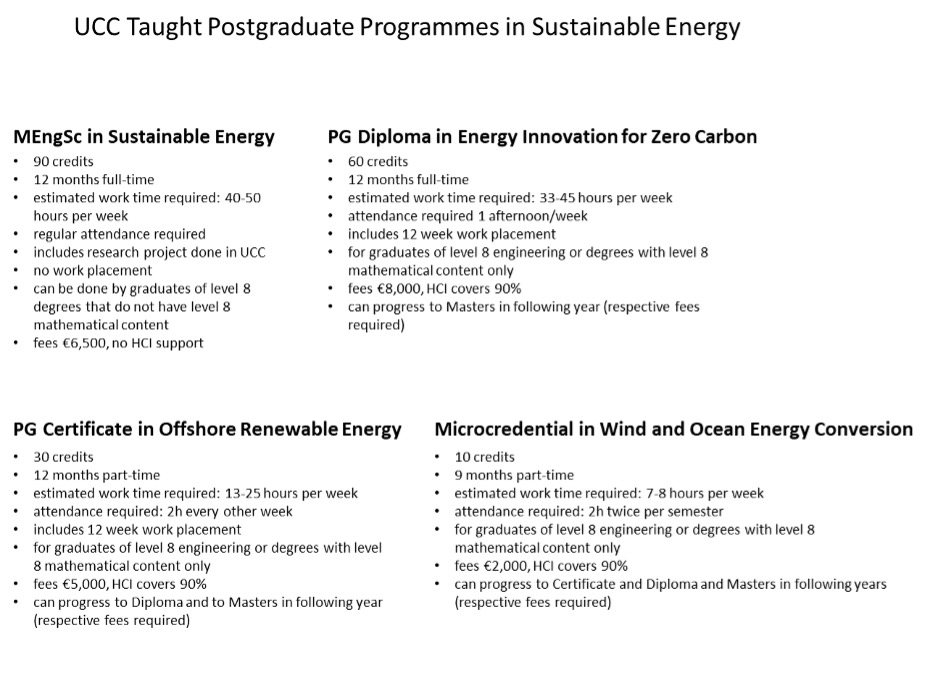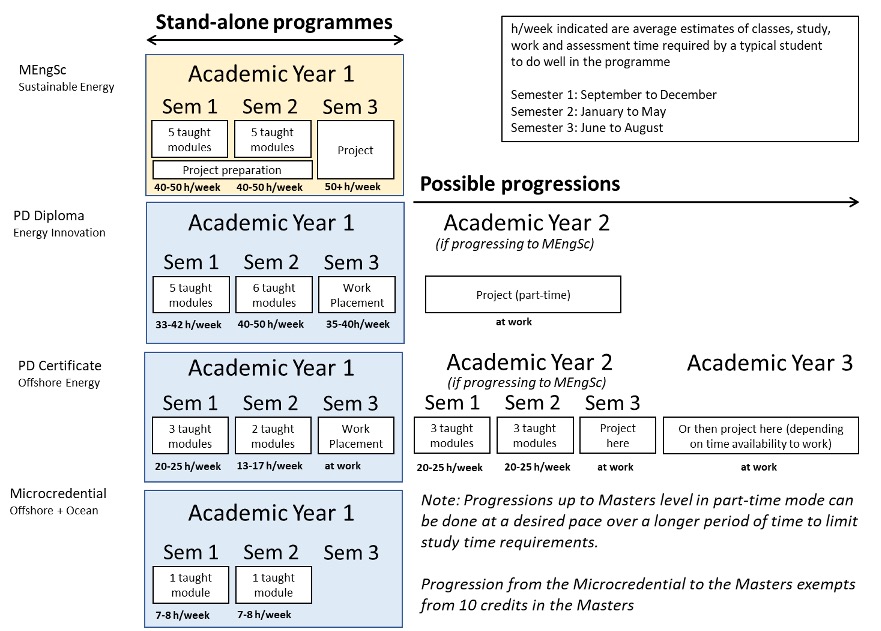| Code | UMCRE |
|---|---|
| Duration | 9 Months |
| Teaching Mode | Part-Time |
| Qualifications | N/A |
| NFQ Level | Level 9 |
| Fees | Free or 90% funded. See Fees and Costs for full details. |
| Closing Date | Rolling deadline. Open until all places have been filled. Early application is advised. |
| Credits | 10 |
| Start Date | 9 September 2024 |
Outline

Our micro-credential programme in Offshore Wind and Ocean Energy Conversion is suitable for engineers and other practitioners in the offshore renewables sector, or those wishing to transition to the sector. Micro-credentials are suitable for anyone looking to upskill or reskill in bite-sized pieces.
This micro-credential introduces the principles of wind and ocean energy systems and allows you to explore this area of wind and energy systems over two Semesters (from September to May).
The course is suitable for engineers or other practitioners in the offshore renewables sector, or those of you wishing to transition to the sector. There is also a need for professionals already working in logistics, project management, planning, non-renewables engineering to upskill in these areas, which will grow in importance in the coming decade. The course provides a broad introduction to offshore renewable technologies and also encompasses environmental aspects.
Our 9-month Offshore Wind and Ocean Energy Conversion programme takes place over two semesters and is focused on the core issues of offshore energy via two modules that cover the study of wave and wind.
Subjects covered include energy storage for offshore wind energy; wind and wave loading of offshore structures; offshore operations and maintenance and systems lifecycle; offshore wind resource estimation and forecasting; design, manufacture, durability, and test of materials for offshore wind energy; economics of marine renewable energy; environmental impacts of offshore wind energy; marine governance and the regulatory regime; introduction to ocean energy; fundamentals of waves; nearshore waves; ocean waves and wave energy technologies; fundamentals of the tide; and tidal energy technologies.
The modules are part of the PG Certificate, so on completion of this programme you can progress, if you wish, to PG Certificate Offshore Renewable Energy, PG Diploma Energy Innovation for Zero Carbon, and eventually MEngSc Sustainable Energy level, at whatever pace you wish. (Note that there is no assurance of continuing HCI support for students who progress.)
Practicalities
The 9-month Offshore Wind and Ocean Energy Conversion programme takes place over two semesters and will run jointly with the PG Certificate. Attendance requirement will thus be for 2 tutorials in each semester. The module is assessed by assignments to be completed during Semesters 1 and 2.
Why Choose
This micro-credential will provide you with an understanding of advanced engineering and non-engineering issues relevant to wind and ocean energy device design, operations, finance, economics, governance, and their utilisation, providing you with a unique skillset essential to this sector.
We include guest lectures from industry representatives delivering specialist subject expertise and ensuring the application of knowledge with real-world examples.
Skills and Careers Information
The School of Engineering and Architecture at UCC has close connections, contact, and collaboration with new companies emerging in the areas related to offshore renewable energy. We understand the needs and training requirements of these companies, for new employees previously working in other sectors. In the past year, we have engaged with the industry representative body Wind Energy Ireland, and with key players in the industry such as Statkraft, Gavin & Doherty Geosolutions, Ørsted and the ESB.
A common theme from all companies is the difficulty in recruiting skilled professionals who are ready to work in renewable energy development; by taking this micro-credential in Offshore Wind & Ocean Energy Conversion you will be ideally placed to meet the demands of this sector.
These courses in Cork would be incredibly valuable. ~ Ørsted UK & Ireland.
Requirements
Applicants must have a minimum Level 8 qualification in any area of engineering, physics, mathematics, environmental science, ecology, biology, or similar.
Recognition of Prior Learning
Applicants who do not meet this entry requirement will be considered under Recognition of Prior Learning (RPL) and be assessed on the following factors:
- Academic achievement
- Prior work experience
- Letter of reference
- Personal statement
Applicants that are non-native speakers of the English language must meet the university-approved English Language Entry Requirements.
Fees and Costs
Places will be subsidised under the Human Capital Initiative (HCI) Pillar 1 as follows:
- Standard EU Fee: €2,000
- 90% Subsidised Fee: €200
- 100% Subsidised Fee: No course fee is payable by the applicant.
See What will it cost? on the HCI webpage for more information.
How To Apply
Applications are now open and can be made via Springboard+
- Apply here if you already have a Springboard+ account.
- Register and apply here if you are new to Springboard+
- When you log in to your existing account or register for a new account, go to the courses tab at the top of the page and search for the course you are interested in applying for. Further instructions can be found in the How do I apply section of the Springboard+ webpage.


